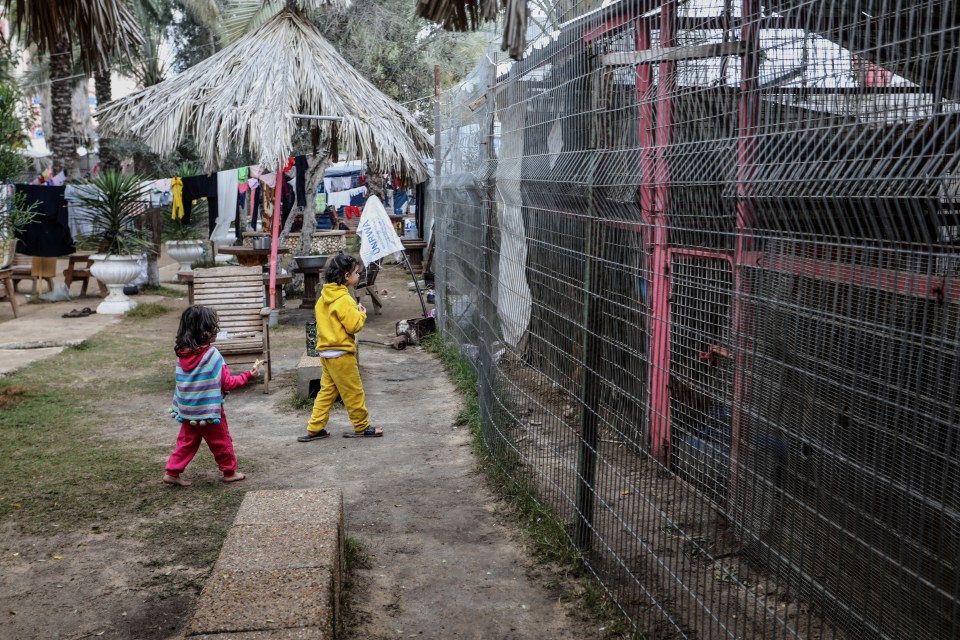IN GAZA’s only zoo, destitute Palestinian families have been camping by the cages where starving animals have been crying out for food.
Almost 90 per cent of Gaza’s population have been displaced since Israel launched their offensive, forcing many into makeshift shelters lining the rubble-ridden streets and around this zoo.
GettyPlastic tents, washing lines and multiple families have joined the starving animals in Rafah zoo[/caption]
GettyAnimals and humans alike are enduring harsh conditions in this zoo as Israel continues its offensive[/caption]
GettySome of the animals in the zoo have already died from starvation[/caption]
“There are many families who have been completely wiped out. Now all our family is staying in this zoo,” said Adel Gomaa, who fled from Gaza City.
“Living among the animals is more merciful than what we get from the war planes in the sky.”
Lines of plastic tents have been strung from the metal bars of animal cages, alongside washing lines overflowing with an array of clothes.
Inside the cages, are emaciated animals in excruciating pain.
Four monkeys have already died, so have some lion cubs, and some animals are so weak that they cannot feed themselves whenever food becomes available.
Ahmed Joumaa, the owner of Rafah Zoo, has expressed concern that more animals will die unless they get help soon.
He said: “At the beginning of the war, we were able to manage, then it went out of control.
“Food is not available, and some animals have died, for example, the lioness has given birth but we couldn’t provide for it.
“The cubs died, and the same thing happened with the monkeys and with the birds.
“The situation is very tragic, there’s no food, water, medicine, or anything.”
He explained that they have been trying to feed the animals water soaked bread just to keep them alive.
But, despite their best efforts animals are falling ill and dying every day. The cases of starvation, weakness and anemia have become widespread, and until assistance arrives there is little they can do.
The Israeli offensive has led to a steep rise in feed prices – which rose from 70 shekels to 400 shekels, and is currently unavailable – as well as a scarcity of meat.
Last week the UN backed a report that warned the entirety of Gaza’s 2.3 million population is facing an increasing risk of famine.
90 per cent of the population have said that they regularly go without food for a whole day.
While there have also been cases of people begging for bread, paying extortionate amounts for cans of beans, and eating raw donkey meat.
The report said that the region is “grappling with catastrophic hunger” and reiterated calls for a “humanitarian ceasefire”.
“There is a risk of famine and it is increasing each day that the current situation of intense hostilities and restricted humanitarian access persists or worsens.”
The report added that, while Egypt has been able to send some aid trucks to deliver food, water and medicine, the quantity delivered is just 10 per cent of what the territory’s inhabitants need.
Human Rights Watch has accused Israel of punishing Gaza civilians for the Hamas’ actions, and of “using starvation of civilians as a method of warfare.”
Omar Shakir, the Israel and Palestine director at Human Rights Watch, said that Israel has been purposefully depriving Palestinians of food and water.
He said: “For over two months, Israel has been depriving Gaza’s population of food and water, a policy spurred on or endorsed by high-ranking Israeli officials and reflecting an intent to starve civilians as a method of warfare,
“World leaders should be speaking out against this abhorrent war crime, which has devastating effects on Gaza’s population.”
GettyThe scarcity of food across Gaza and increase in feed prices has led to a dire situation for animals and humans alike[/caption]
GettySome animals in Rafah zoo are so weak now that they can no longer feed themselves[/caption]
GettyAlthough some aid has been able to enter the besieged enclave, it’s not nearly enough to counter the pervasive problems[/caption]

